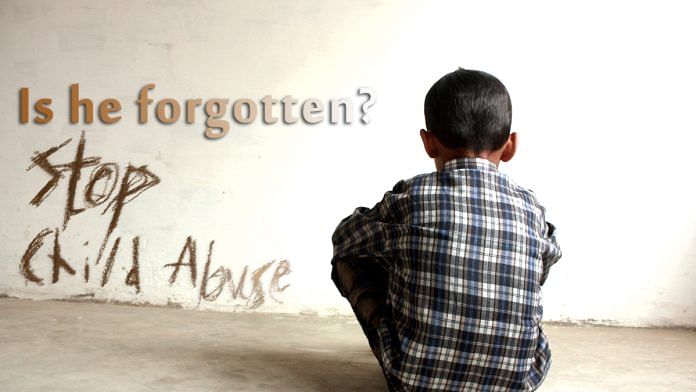Thank you dear subscribers, we are overwhelmed with your response.
Your Turn is a unique section from ThePrint featuring points of view from its subscribers. If you are a subscriber, have a point of view, please send it to us. If not, do subscribe here: https://theprint.in/
Being a parent is a tough task. But being a child is a tougher task. Just when they think that they have understood the rule of the grown-up’s land and know what’s right and who’s wrong, we adults surprise them with a new list of don’ts and shouldn’ts.
Children barely understand black and white, and here we bombard them with all the shades of grey and brown. For example, we tell them that when an uncle or an aunt pat their head or ruffle their hair, they can soak their love and enjoy all the affection. However, when someone touches some other parts, they need to raise an alarm. For a child, the entire idea of good touch and bad touch is confusing. In all honesty, even as an adult this can be quite baffling and difficult to decipher.
On one hand, we expect them to greet family with all the love and respect as they can, but we grown-ups are also aware of the many cases of abuse where family and close friends are the culprits so we try and warn them about them too. Result is obviously an utterly confused and frightened child.
Children need to grow up with an innate trust in the world around and with a belief that the world is indeed a safe, nice place brimming with love and respect. What is a child’s world if not about candy houses, flying witches, vegan lions, flying carpets and everything magic? And yet, what if this all constitute into a dangerous perfect world they believe in, which clearly doesn’t exist.
A little too much of Crime Patrol and they can become suspicious and non-trusting, a little too much fantasy and they are easiest preys to abuse. So as grown-ups, how do we tell them how it is and yet not make them overly anxious, suspicious or cynical?
Have Same Rules for Everyone
It is very important to be consistent with the rules you make. That means, the rules apply to you too.
So if while bathing them, for instance, take their permission, and tell them that they can let you know if they feel uncomfortable. This way, they will not be confused or need to remember too many things about the rules.
Respect Their Opinion
Our society often mistakes respect with age. So children might be immensely loved, but they aren’t exactly respected. But respect means valuing their opinion, not mocking or belittling them in the process, giving them space to express themselves freely and reacting appropriately (neither over nor under) to their concerns.
When a child can come to us without the fear of being judged or the fear of us reacting violently, they will ask questions. Questions is the only way they will slowly start to understand the greys we want them to see.
Control your emotions when they talk
When you explain abuse to a child, don’t tell them that you would kill anyone who as much as tries to hurt them. Oftentimes, the abusers are someone very close to the family. Children might want to protect their abuser from you and your claimed anger.
Use their imagination to empower them
Children have the magical powers of imagination. Use their imagination to create ‘what if’ situations without making them too serious. For example, create various situations and ask, ‘What if…, what would you do?” This will help them build decision making skills and will help you understand how well have you been able to convey a message.
Tell them your own story
Children, who have been abused, are often known to shut themselves up feeling isolated and wondering if they are the only ones going through this. They also end up feeling guilty and responsible for their abuse.
It is important to let them know that abuse is NEVER their fault and instead of just saying that, share your own harmless secrets with them. This way, you would also be encouraging them to share their secrets and feel relieved that it is not their fault if someone tries to molest them or abuse them.
Respect their Intuitions
Tell your child that you would always listen and never question their feelings if they ever tell you that they aren’t comfortable around somebody. Sometimes the heart and the vibe picks danger much before our conscious self does, and so if the child feels that a person is not safe for her, chances are he isn’t.
Don’t try to justify the other person just because they are related to you or because there is no clear reason for the child feeling so. May be the child has misjudged a person, but as a parent, I am sure you would rather be safe than sorry.
These pieces are being published as they have been received – they have not been edited/fact-checked by ThePrint.

